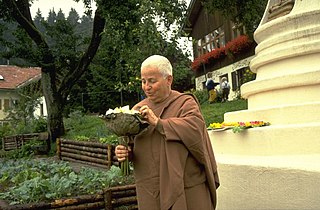A Quote by Deepak Chopra
We all feel the urge to condemn ourselves out of guilt, to blame others for our misfortunes and to fantasize about total disaster.
Related Quotes
All of us are prone to excuse our own mediocre performance. We blame our misfortunes, our disfigurements, our so-called handicaps. Victims of our own rationalization, we say silently to ourselves, 'I'm just too weak,' or 'I'm not cut out for better things.' Others soar beyond our meager accomplishments. Envy and discouragement take their toll. .
If we don't forgive ourselves for our mistakes, and others for the wounds they have inflicted upon us, we end up crippled with guilt. And the soul cannot grow under a blanket of guilt, because guilt is isolating, while growth is a gradual process of reconnection to ourselves, to other people, and to a larger whole.
If we divide into two camps--even into violent and the nonviolent--and stand in one camp while attacking the other, the world will never have peace. We will always blame and condemn those we feel are responsible for wars and social injustice, without recognizing the degree of violence within ourselves. We must work on ourselves and also with those we condemn if we want to have a real impact.
There is a foundation for our lives, a place in which our life rests. That place is nothing but the present moment, as we see, hear, experience what is. If we do not return to that place, we live our lives out of our heads. We blame others; we complain; we feel sorry for ourselves. All of these symptoms show that we're stuck in our thoughts. We're out of touch with the open space that is always right here.
One of the fundamental demonstrations of our natural instinct to Bond with each other is a will to give. Rather than domination, our most basic urge is to reach out to another human being, even at a cost to ourselves. Giving to others-the urge to empathize, to be compassionate, and to help others altruistically-is not the exception to the rule, but our natural state of being. Our impulse to connect with each other has developed an automatic desire to do for others, even at personal cost. Altruism comes naturally to us. It is selfishness that is culturally conditioned and a sign of pathology.
One of the less attractive aspects of human nature is our tendency to hate the people we haven't treated very well; it's much easier than accepting guilt. If we can convince ourselves that the people we betrayed or enslaved were subhuman monsters in the first place, then our guilt isn't nearly so black as we secretly know that it is. Humans are very, very good at shifting blame and avoiding guilt.
Buddhist words such as compassion and emptiness don't mean much until we start cultivating our innate ability simply to be there with pain with an open heart and the willingness not to instantly try to get ground under our feet. For instance, if what we're feeling is rage, we usually assume that there are only two ways to relate to it. One is to blame others. Lay it all on somebody else; drive all blames into everyone else. The other alternative is to feel guilty about our rage and blame ourselves.
Many of our feelings of satisfaction or dissatisfaction have their roots in how we compare ourselves to others. When we compare ourselves to those who have more, we feel bad. When we compare ourselves to those who have less, we feel grateful. Even though the truth is we have exactly the same life either way, our feelings about our life can vary tremendously based on who we compare ourselves with. Compare yourself with those examples that are meaningful but that make you feel comfortable with who you are and what you have.
You have no idea how much of the inefficiency of mankind comes from thinking about the wrong-doings of others, and of ourselves. There is nothing more miserable than to feel that by some mistake in life you have not amounted to what you might have, and that your misfortunes all hinge on that mistake.
Guilt is also a way for us to express to others that we are a person of good conscience. 'I feel really guilty about getting drunk last night,' we say, when in actual fact we feel no guilt whatsoever or, at least, we could choose to feel no guilt. When people say to me, 'I drank too much last night,' I always reply, 'I drank exactly the right amount.
Guilt is imposed by others on you. It is a strategy of the priests to exploit. It is a conspiracy between the priest and the politician to keep humanity in deep slavery forever. They create guilt in you, they create great fear of sin. They condemn you, they make you afraid, they poison your very roots with the idea of guilt. They destroy all possibilities of laughter, joy, celebration. Their condemnation is such that to laugh seems to be a sin, to be joyous means you are worldly.




































